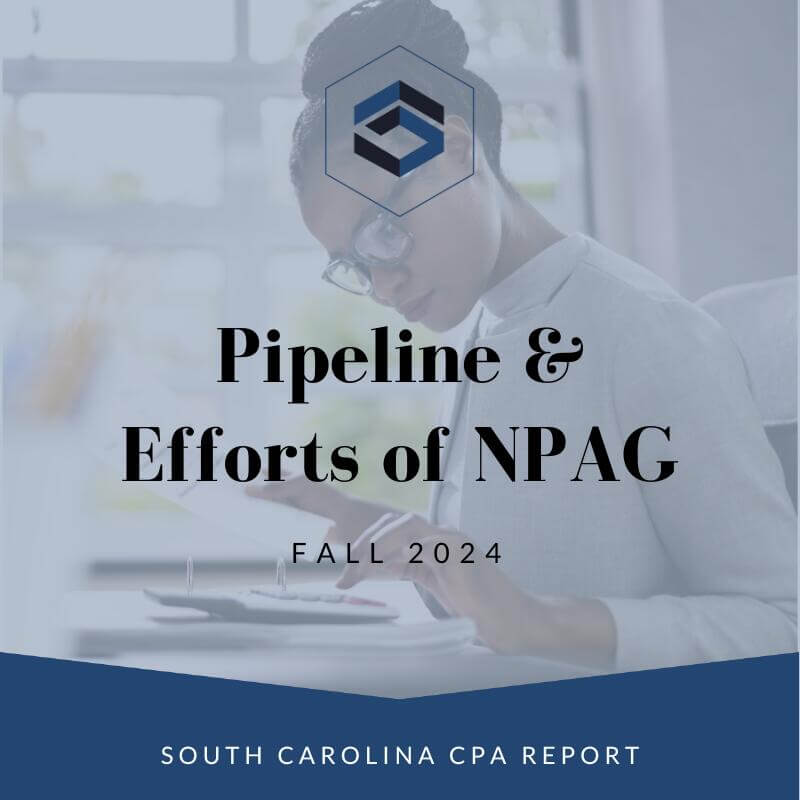The AICPA’s National Pipeline Advisory Group (NPAG) initially began work in July 2023 to respond to the accounting talent shortage, which is currently one of the accounting profession’s most pressing issues. After extensive research, surveys, and stakeholder engagement, the NPAG issued a comprehensive report on August 1, 2024, outlining six critical recommendations aimed at revitalizing the accounting talent pipeline. These recommendations are grounded in data collected from nearly 8,000 survey responses, feedback from over 15,000 participants in briefing sessions, and commentary from individuals who reviewed the report’s draft. This article will explore the NPAG’s top recommendations for improving the talent pipeline in the accounting profession.
Recommendation #1: Make the Academic Experience More Engaging
One of NPAG’s key findings is that the traditional academic path to accounting is often disengaging for students, which has contributed to declining enrollment in accounting programs. To counter this, the NPAG recommends a complete overhaul of how introductory accounting courses are taught. The aim is not to make these courses easier but to make them more relatable and engaging, particularly for undecided students who may be evaluating accounting as a potential career.
The NPAG advocates for shifting the focus of early accounting courses from the technical aspects, like debits and credits, to more dynamic content that emphasizes the broader impact accountants can have on business and society. Introducing students to the entrepreneurial opportunities in accounting and showcasing how technology can bring accounting concepts to life are among the strategies suggested. By making the academic experience more engaging, accounting programs can help reduce the high attrition rates associated with the major.
Recommendation #2: Address the Time and Cost of Education
The 150-hour requirement for CPA licensure remains a significant deterrent for many students. According to the NPAG’s report, more than half of business majors who did not pursue accounting cited the 150-hour requirement as too time-consuming and costly. The NPAG proposes a more flexible approach, allowing students to earn experiential learning credits either through accredited institutions or workplace learning programs. This shift would help students accumulate the necessary hours for licensure in a way that is more affordable and aligned with real-world experience.
A longer-term recommendation is to explore a competency-based model of licensure, which would assess candidates on their mastery of skills and knowledge rather than on the completion of a set number of educational hours. This approach, already used in other licensed professions, would help ensure that CPA candidates are qualified while allowing for more flexibility in how they meet the requirements.
The new exposure draft issued by the AICPA and NASBA can be found at https://www.aicpa-cima.com/certifications/download/exposure-draft-proposed-cpa-competency-based-experience-pathway.
Recommendation #3: Grow Support for CPA Exam Candidates
NPAG’s recommendations for the CPA Exam focus on alleviating some of the barriers that discourage candidates from completing the exam process. Reducing exam costs, providing rewards for passing individual sections, and offering more flexibility in scheduling exams are among the suggested improvements. Additionally, simplifying the application and eligibility processes would make it easier for prospective CPAs to navigate the exam requirements.
Recommendation #4: Expand Access for Underrepresented Groups
Diversity remains a critical issue in the accounting profession. NPAG emphasizes the need to attract underrepresented populations through targeted outreach and scalable experiential programs. Building stronger relationships between the accounting profession and community colleges, minority-serving institutions, and four-year colleges is essential to this goal. By increasing diversity, the profession can better reflect the makeup of the U.S. population and enhance the quality of the talent pool.
Recommendation #5: Enhance the Employee Experience
Another important factor in reversing the talent shortage is improving the workplace experience for accountants. NPAG highlights the need for competitive starting salaries, more manageable workloads, and clearer paths for career advancement. Firms must demonstrate that the return on investment for an accounting education is worthwhile, both in terms of compensation and work-life balance. Accounting associations and state CPA societies can offer resources and best practices, but the responsibility ultimately lies with employers to make accounting careers more attractive to top talent.
Recommendation #6: Tell a More Compelling Story
Finally, the profession needs to address outdated and negative perceptions about accounting careers. The NPAG calls for a grassroots effort to reshape the narrative around the profession, highlighting the flexibility, prestige, and social relevance that accounting offers. By promoting diverse voices and amplifying existing resources, the profession can begin to shift how it is perceived by prospective students and professionals.
The accounting profession is at a critical juncture and addressing the talent shortage will require coordinated efforts from all key stakeholders, including the AICPA, NASBA, state licensing boards, and educational institutions. Implementing NPAG’s recommendations will not only help to rebuild the talent pipeline but also ensure that the profession remains relevant and resilient in the years to come. Continuous collaboration and innovation will be essential as the profession navigates this transformative period. The full report from the National Pipeline Advisory Group can be found at accountingpipeline.org/npag-report.


